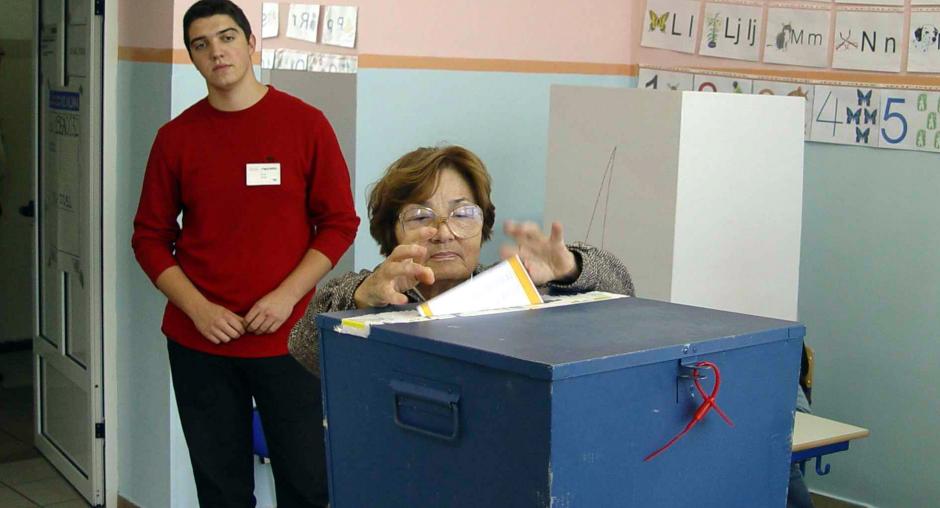Newsroom
BiH elections mark progress towards democracy, international observers report
SARAJEVO 3 October 2004

(OSCE)A voter in Sarajevo casts her ballot in the municipal election in Bosnia and Herzegovina on 2 October 2004.
(OSCE) Photo details
SARAJEVO, 3 October 2004 - The municipal elections in Bosnia and Herzegovina on 2 October were administered in line with international standards, taking into account the country's unique, post-war political system. This was the conclusion of the International Election Observation Mission (IEOM), which published its preliminary findings today, based on the work of some 200 international observers.
The mission was deployed by the OSCE Office for Democratic Institutions and Human Rights, (OSCE/ODIHR) and joined by representatives from the Council of Europe's Congress of Local and Regional Authorities of Europe.
"The successful conduct of these elections was a noteworthy achievement, which marks further progress towards democracy and the rule of law under domestic control," said Peter Eicher, Head of the OSCE/ODIHR mission. "However, these remain essentially transitional elections, since the ultimate authority over elections in Bosnia and Herzegovina still lies with the international community."
"Election day was peaceful and well ordered," said Stanislav Bernat, Head of the Congress delegation, adding: "Two particularly positive steps were the direct election of mayors for the first time in most places and the first democratic local election in the Brcko district, bringing democracy closer to voters." The overall campaign was calm. Voter turnout, however, was disappointingly low.
The IEOM regretted ethnicity remained the main underlying issue in the election campaign, although it noted the increased efforts of some political parties to appeal to voters of more than one ethnicity. While some parties made genuine attempts to address local issues, overall there was little meaningful debate on such issues and the campaign was dominated by national concerns such as unemployment and pensions.
The elections were noteworthy for several accomplishments. Human rights were generally well respected. The national Election Commission enjoys a high level of trust by political parties. Most of its decisions are taken by consensus. The two entity broadcasters provided significant but lacklustre coverage of the elections, and the print media was lively and sometimes partisan.
Shortcomings included an unduly complicated electoral system. The failure by authorities to ensure timely funding for the elections caused problems for the election administration. The failure of public officials to fulfill their responsibilities under the General Framework Agreement for Peace led to a need for continuing international involvement in the elections, including in ways that were sometimes irregular, or even undemocratic, in terms of international election standards.
Election day was calm, with no reports of serious incidents and observers assessed voting procedures positively in an overwhelming number of polling stations observed. The problems that occurred were mainly related to people unable to find their names on the voter register, group voting and unauthorized persons in the polling stations. A few polling stations opened late due to minor incidents or failures by local election administrators. The counting and tabulation of results was evaluated as "weak" or "very weak" in 20 per cent of cases, although this reflected poor procedures rather than manipulation.
The mission was deployed by the OSCE Office for Democratic Institutions and Human Rights, (OSCE/ODIHR) and joined by representatives from the Council of Europe's Congress of Local and Regional Authorities of Europe.
"The successful conduct of these elections was a noteworthy achievement, which marks further progress towards democracy and the rule of law under domestic control," said Peter Eicher, Head of the OSCE/ODIHR mission. "However, these remain essentially transitional elections, since the ultimate authority over elections in Bosnia and Herzegovina still lies with the international community."
"Election day was peaceful and well ordered," said Stanislav Bernat, Head of the Congress delegation, adding: "Two particularly positive steps were the direct election of mayors for the first time in most places and the first democratic local election in the Brcko district, bringing democracy closer to voters." The overall campaign was calm. Voter turnout, however, was disappointingly low.
The IEOM regretted ethnicity remained the main underlying issue in the election campaign, although it noted the increased efforts of some political parties to appeal to voters of more than one ethnicity. While some parties made genuine attempts to address local issues, overall there was little meaningful debate on such issues and the campaign was dominated by national concerns such as unemployment and pensions.
The elections were noteworthy for several accomplishments. Human rights were generally well respected. The national Election Commission enjoys a high level of trust by political parties. Most of its decisions are taken by consensus. The two entity broadcasters provided significant but lacklustre coverage of the elections, and the print media was lively and sometimes partisan.
Shortcomings included an unduly complicated electoral system. The failure by authorities to ensure timely funding for the elections caused problems for the election administration. The failure of public officials to fulfill their responsibilities under the General Framework Agreement for Peace led to a need for continuing international involvement in the elections, including in ways that were sometimes irregular, or even undemocratic, in terms of international election standards.
Election day was calm, with no reports of serious incidents and observers assessed voting procedures positively in an overwhelming number of polling stations observed. The problems that occurred were mainly related to people unable to find their names on the voter register, group voting and unauthorized persons in the polling stations. A few polling stations opened late due to minor incidents or failures by local election administrators. The counting and tabulation of results was evaluated as "weak" or "very weak" in 20 per cent of cases, although this reflected poor procedures rather than manipulation.
